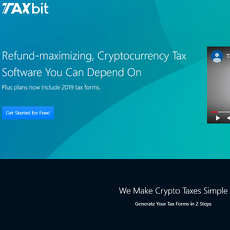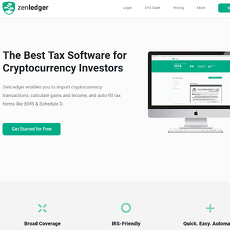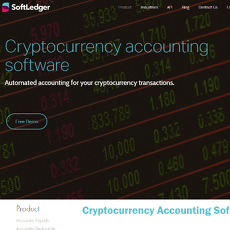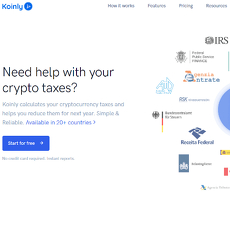Accointing.com Review
Accointing.com
www.accointing.com
Accointing.com Review Guide: Everything You Need to Know (With FAQ)
Ever stared at a spreadsheet full of crypto transactions and thought, “How in the world am I supposed to turn this chaos into a clear, legit tax report?” If so, you’re not alone. Managing crypto taxes has become one of the top pain points for crypto users—whether you’re a casual investor, a dedicated trader, or someone who just collects airdrops and NFTs for fun.
Here’s what’s wild: according to a recent crypto tax studies roundup, over 50% of crypto holders admit they either messed up a tax filing, missed a transaction, or avoided reporting altogether. It’s not just the rules that make things stressful—it’s having to track every swap, trade, or transfer across dozens of wallets and exchanges.
Why Crypto Taxes Are a Huge Headache
Let’s get real: cryptocurrency confuses tax authorities just as much as it confuses us. Every few months, there’s a new regulation, an updated IRS guideline, or a “friendly reminder” from your exchange that your tax info has been sent directly to the government. Forgetting a transaction or getting the numbers wrong isn’t just annoying—it could cost you real money in penalties or audits.
- Did you sell ETH for USDT on DeFi and forgot about that liquidity pool you joined three months ago? Yep, that’s taxable.
- Sent some coins from Binance to Metamask? That’s just a transfer, but if you mess up how you report it, you can mess up your cost basis, too.
- Multiple wallets, endless CSV files, lost passwords... it’s no wonder tax season gives crypto folks cold sweats.
Why Most People Get Frustrated Doing Crypto Taxes
Crypto taxes aren’t as easy as plugging numbers from a bank statement into TurboTax. There’s no standard form for your trades, staking rewards, or mining payouts. If you forget a wallet or misunderstand a taxable event, your report is wrong—end of story. And with tax agencies everywhere stepping up enforcement, the margin for error gets narrower every year.
Let’s be honest. Have you ever wondered…
- “Can’t I just pay taxes when I cash out to fiat?”
- “Do I have to include every single swap and trade from three different exchanges?”
- “What if my accountant doesn’t even ‘get’ crypto?”
If you’ve asked any of those, you’re in the right place—and trust me, you’re not the only one.
The Promise of Crypto Tax Software
Here’s where smart tools come into play. Good crypto tax software should do the hard work for you, automatically collecting your transaction histories, organizing trades, and generating tax reports that actually make sense for your country’s rules. No more spreadsheet nightmares. No more calculator meltdowns. Just upload your stuff and let the algorithm do the rest.
What’s Coming Up In This Article
But is Accointing.com actually up to the task? I’m about to show you how Accointing.com tackles the mess of crypto taxes, what makes it unique, and whether it’s the real answer to the crypto tax stress. Plus, I’ll answer the burning questions I get from readers all the time and share what to look out for when choosing any crypto tax software.
Stick around if you want to finally stop stressing about crypto taxes. Ready to see exactly what sets Accointing.com apart—and whether it’s the tool you’ve been searching for? Let’s jump to the details and some real-world answers. Curious what Accointing.com actually is and why you should even care? The next part has the full answer.
Introducing Accointing.com: What Is It and Why Should You Care?
Quick answer? Accointing.com is like that overachiever in the class who volunteers to organize everyone’s messy folders—and nails it every time. It’s a crypto portfolio tracker and tax reporting tool designed to make sense of your tangled web of crypto transactions, so you can finally breathe easy.
“Taxes are what we pay for a civilized society.” – Oliver Wendell Holmes Jr.
Sure, Holmes wasn’t talking about Bitcoin or NFTs, but if your wallet looks like a spreadsheet run amok, tools like Accointing.com are the digital civilization you need.
What Does Accointing.com Actually Do?
Here’s the magic: Accointing.com pulls together transactions from wherever you’ve been trading—Binance, Coinbase, MetaMask, you name it. It then sorts everything, handles duplicates, and spits out those tax numbers you’re dreading.
- API imports? Yes, so there’s no need to painfully copy and paste transaction after transaction.
- Sorts hundreds (or thousands!) of trades? Absolutely—whether you’re a Bitcoin HODLer, a DeFi fan, or flipping NFTs.
- Calculates complex gains/losses? You bet. No more pulling your hair out at midnight with last year’s statements.
I’ve watched experienced traders breathe sighs of relief after seeing all their exchanges, wallets, and DEXes finally come together in a dashboard they understand.
Who Is It For?
If "tax season" makes your palms sweat and you’ve got more than one crypto on your radar, you’re the target user. Maybe you:
- Trade across multiple exchanges?
- Buy dips, sell tops, and experiment with DeFi staking?
- Just want to know your profits (without a calculator meltdown)?
Plenty of folks think this kind of tool is only for day traders or crypto whales. That’s just wrong. Even casual investors or first-timers in crypto get hit with reporting requirements. The IRS estimated over $4.4 billion in unpaid crypto taxes in the US alone by 2022—a clear sign that people are struggling. Why risk costly mistakes?
Standout Features Worth Knowing
- API Integrations: Most big platforms connect directly, so your data flows in automatically. No more CSV nightmares (unless you want them!).
- User-Friendly Dashboard: Forget wall-of-text forms. Accointing.com gives you a snapshot—your gains, losses, portfolio performance—as easy as glancing at your phone screen.
- Automated Tax Reports: One click. One download. One less reason to panic at tax time.
- Smart Categorization: Ever had a random airdrop land in your wallet? It knows how to flag that for taxes.
This isn’t just hype—real users have reported saving hours, and sometimes even hundreds of dollars, compared to old-school spreadsheets. The point is: Accointing.com doesn’t just save time, it can actually save you money. And in this game, that's everything.
But features are one thing—how does it actually work in real life when it integrates with exchanges, tracks portfolios, and spits out those essential reports? Want to know how smooth the process is, and whether it’s worth your time and crypto? Let’s find out in the next section (where you just might discover your new favorite crypto shortcut)…
Key Features and Integrations: How Accointing.com Works
Supported Exchanges and Wallets
Ever lost track of a random coin you bought last year on an obscure exchange? I know the struggle. Accointing.com fixes this headache by letting you import your entire transaction history from a massive list of exchanges and wallets. Whether you’re trading on big names like Binance, Coinbase, Kraken, or using hardware wallets—API integration takes seconds and pulls everything in, almost magically accurate. If you keep your coins on a less-known exchange or want old-school control, there’s always the manual (but easy) CSV upload route.
- API Integration: Secure, fast, and way less prone to mistakes—perfect for frequent traders.
- CSV Uploads: Solid backup option for platforms without direct API connections.
- Auto-Sync Features: Daily syncing ensures your portfolio view is up to date, and you won’t forget a single trade come tax time.
Portfolio Tracking Perks
Some people think crypto tax tools are just for end-of-year stress. Honestly, the portfolio tracker here is reason enough to log in all year round. You see a snapshot of all your holdings: coins, tokens, even stablecoins—broken down by gains, losses, and overall performance. It goes way deeper than, say, looking at your Binance screen. One user made 127 trades in 2023, across 4 exchanges—Accointing.com pulled those in and gave him a clear, color-coded breakdown of his wins and losses in minutes. No more wild guessing.
- Real-time gains and losses tracking
- Custom price alerts for those “should I sell?” moments
- Historical performance charts: see how your portfolio did compared to Bitcoin, Ethereum, and the total market cap
“It’s not about having the most crypto, it’s about knowing what you have and what it’s truly worth.”
Tax Report Generation
Here’s where all the magic comes together—one click, and you get a tax report built for your local laws. Whether you’re in the US, UK, Canada, Australia, Germany, or Switzerland, the export matches what your accountant (or tax authorities) expect. Forget scrambling for receipts and sifting through endless spreadsheets. You get the right forms, the right numbers, and even reports formatted for TurboTax if you want to run the DIY route.
- Supports leading tax forms like IRS Form 8949 (US), HMRC Capital Gains Summary (UK), and more
- Breaks down income, airdrops, staking, and DeFi yields separately
- Preview function: double-check before you file
People who’ve tried other tools often say Accointing’s reports are cleaner and easier for accountants to process.
User Interface and Experience
If scrolling through crypto dashboards makes your head hurt, breathe easy. The interface here is uncluttered and simple—big icons, step-by-step wizards, and no tiny, cryptic links hidden in footers. Setting up your first portfolio takes maybe 10 minutes; navigating between exchanges or switching to tax mode feels as smooth as checking your favorite mobile app. Even if spreadsheets make your eyes glaze over, you’ll feel at home.
- Dashboard with instant portfolio value
- Mobile-friendly views for trading on the go
- Error notifications: missing data or mismatched transactions flagged fast, so you can fix things before tax time panic hits
Plans & Pricing
The software offers both free and paid plans. Good news if you’re just curious—there’s a zero-cost tier with basic tracking and reports for lower-volume users. For more advanced needs (think tons of trades, unlimited data imports, deeper tax forms), paid plans unlock those extras—and, compared to some rivals that charge by transaction volume or extra tax reports, it’s actually pretty reasonable.
- Free Plan: Basic portfolio tracker, up to a set number of transactions, basic tax summary
- Paid Plans: Unlock more transactions, advanced analytics, support for multiple tax jurisdictions
- Price Range: Typically from $79–$299/year, which is cheaper than messing up your taxes.
Transparency’s a big plus here—no hidden “processing fees” or weird surcharges mid-signup. Looking for a tool that gives you a taste before you commit? You can try almost everything before handing over your credit card.
At the end of the day, having all these features in one place means less jumping between platforms and way fewer headaches. But there are things that matter just as much—like how to actually use this software for maximum peace of mind, or what to do when the IRS comes knocking about your crypto. Wondering what you really need to know about the world of crypto tax? The most asked questions (and some answers that might surprise you) are coming up—keep reading and get ready to clear the fog.
Answers to The Most Common Crypto Tax Questions
What Is Crypto Tax Software, and Why Do You Need It?
Think about trying to piece together every single crypto trade you’ve made in the last year. Not just those big BTC buys, but the random swaps, airdrops, staking rewards from DeFi, and that $5 of obscure coin you grabbed for fun. If you try to do it solo, you’ll end up in a maze of spreadsheets and calculators.
Crypto tax software automates the heavy lifting. It pulls all your trades from different wallets and exchanges, crunches the numbers, and spits out tax reports that would make any accountant proud. With tax laws getting stricter and tax authorities paying way more attention, skipping proper reporting isn’t a gamble worth taking.
“The hardest thing in the world to understand is the income tax.” — Albert Einstein (and if even he thought so, we should probably get some help!)
If you’re serious about crypto, any tool that saves you from stress and accidental mistakes is pretty much a must.
Do I Have to Pay Taxes on Crypto If I Don’t Cash Out?
Here’s where a lot of folks get nervous. The simple answer: holding crypto—even if it’s mooning—doesn’t trigger taxes. You’re only taxed when you sell, trade, or spend your crypto. But there’s a catch: you have to keep spot-on records in case you do eventually sell or trade.
- Bought ETH in 2020 but never sold? No tax.
- Traded ETH for ADA in 2023? That’s a taxable event.
- Spent BTC on coffee? That’s also a taxable event (yes, even if it was a latte!).
Don’t rely on memory—solid data makes a huge difference if you ever get audited.
Can I Cash Out Crypto Without the IRS Noticing?
I get this question constantly. In all honesty: not legally. Most mainstream exchanges are tightly regulated now, especially in the US and UK. When you switch crypto to fiat (even if you’re just moving it to PayPal or your bank), that transaction is on the record.
Some people try creative workarounds, but those shortcuts can backfire—big time. For example, in 2021, the IRS used Chainalysis and other blockchain analytics to track down millions in unpaid taxes.
- Exchanges like Coinbase, Kraken, and Crypto.com share user info with tax authorities.
- Trying to avoid reporting could trigger audits, fines, or worse.
Instead, smart users use tax tools to spot loss-making trades they can sell (aka “tax-loss harvesting”) to offset gains and lower their bill—legally.
Will My Exchange Tell the IRS About My Crypto?
If you think your exchange is keeping secrets for you… time for a reality check. Major exchanges now report certain trading activity to tax authorities via forms like 1099. For example, Crypto.com started sending these out recently, and it’s just the beginning.
That means, even if you forget to report, the IRS (or your country’s equivalent) might already know. It’s better to be proactive and accurate, using reliable tools to keep your data organized.
Where Can I Learn More?
Hungry for clearer answers and trusted tools? I always recommend checking resources like CoinLedger’s Crypto Tax Guide, H&R Block Crypto Resources, and Gordon Law. And of course, make sure you bookmark the best crypto tax software roundups here for fresh comparisons, real-world tests, and honest insights.
Still curious how to tell which crypto tax tool is worth your trust and money? Stay tuned—the next section breaks down what truly separates the great from the just okay, with factors that most people miss. What should you look for before you pick your tax software? I'll reveal the secrets next.
What Makes a Good Crypto Tax Software?
Let’s cut through the marketing noise and get real: when it comes to crypto tax software, not all tools are created equal. The right pick can literally be the difference between stress-free tax season and a mountain of headaches. A bad pick? You’re risking lost hours, IRS letters, or—worse—a wallet hit you never saw coming.
Compatibility and Supported Countries
Before getting attached to any platform, always ask: “Does this software actually work in my country?” Some tools are laser-focused on one region—like the US or UK—while others try to offer global support (but sometimes fall short on the details). For example, CoinLedger and H&R Block are great for American users, but if you're in Australia or Germany, make sure the software tailors reports to your local needs. Crypto compliance can be a minefield if you use the wrong forms or calculations—so double check this upfront.
Data Import Options: API vs. CSV Upload
This is where convenience either comes in clutch or leaves you wanting to pull your hair out. The best crypto tax software supports API connections. Why does this matter? Imagine syncing all your exchanges, wallets—even DeFi—almost instantly with a couple of clicks. No manual entry, fewer mistakes. Just copy your API key from the exchange, paste it into the platform, and you’re done. If you’re old-school or your platform doesn’t support API, there’s always CSV upload. But…watch out. CSVs can be finicky—if your columns are off or the data doesn’t match, you’ll be stuck editing spreadsheets instead of kicking back after trading. Still, it’s a handy backup option.
Processing Power and Bandwidth
Now, let’s talk performance. Have you heard stories of traders with thousands of transactions crashing their tax software? It happens. Some tools choke if you have high-volume day trading, NFT flipping, or tons of airdrops to log—as in, reports taking hours or failing outright. Most companies stay quiet about their true processing limits, so don’t be shy: reach out and ask about bandwidth if you’re an active trader. Better safe than sorry at tax time.
Features, User Experience, and Customer Support
Ever been lost in a maze of buttons and settings? A confusing interface can lead to mistakes. Good crypto tax software has an intuitive dashboard, easy navigation, and clear results—because your focus should be on your portfolio, not fighting the software. Top-notch customer support is a must, especially if something breaks a week before the deadline. Some platforms even let you share access with your accountant without giving away your passwords (a real lifesaver!).
Pricing and Plan Transparency
The cost can sneak up on you. Crypto tax tools usually have different pricing tiers—maybe free for the first 50 transactions, then paid plans as your volume goes up. Make sure you know what’s included, what’ll cost extra, and if you can upgrade or downgrade easily. Don’t blindly pick the first software you see. Compare feature lists, transaction limits, and price points with top performers on my crypto tax software reviews.
The Team and Their Track Record
Want peace of mind? Look for platforms created or backed by tax professionals and folks with experience in regulatory compliance. Do some sleuthing—check their blogs, their presence in crypto tax discussions, and any partnerships with credible firms. A good sign: companies who update their software quickly when tax laws change, and who produce clear documentation that matches your country’s requirements. Don’t hesitate to ask support what makes their team qualified—after all, you’re trusting them with sensitive financial data!
User Interface and Day-to-Day Perks
Besides just crunching numbers, think about day-to-day usability. Does the software offer real-time portfolio tracking? Can you download files to send to your tax advisor? Bonus points for seamless mobile access, smart visualizations, and ongoing improvements rather than a “bare minimum” approach.
Other Must-Haves
- Robust Security: End-to-end encryption and anonymized data handling are key. Weak security should be a deal-breaker.
- Regular Updates: Crypto moves fast—outdated software won’t help you comply with new regulations or networks.
- Resource Pages: Make use of top guides like the ones I regularly recommend, including H&R Block and Gordon Law for DIY-ers, and the full collection of reviews only on Cryptolinks News.
So, How Do You Find the Perfect Fit?
There’s no one-size-fits-all answer. Are you a casual investor, NFT collector, or hyperactive day trader? Does your country already have clear crypto rules or are you in a gray area?
All these factors—and the ones above—matter. If you've ever felt lost comparing platforms, or frustrated by slow processing and confusing data imports, you’re definitely not alone. I’ve researched, tested, and reviewed the best options to help you make a smart, confident pick—so you can focus less on taxes and more on actually enjoying crypto.
Still wondering if Accointing.com ticks all these boxes and whether it’s actually better than all the guides and legends you’ve heard about? Stick around—coming up next, I’m breaking down if it’s the tax tool that should be at the top of your list or if you should keep searching. What features really matter most, and when is a human accountant still irreplaceable? Hang tight, because you won’t want to miss what’s next!
Should You Use Accointing.com? My Final Thoughts
Who Should Try Accointing.com?
Thinking of finally wrangling that mountain of crypto transactions you’ve been putting off? If the answer is yes, Accointing.com will make your life noticeably easier. It’s perfect if you want everything in one dashboard and hate the idea of cross-referencing spreadsheets with your bank statements.
I’ve personally seen a lot of users who once lost sleep over tracking trades in DeFi, NFTs, and a fistful of exchanges breathe a sigh of relief with Accointing.com. For instance, if you’re just getting started and mostly trade on big platforms like Binance, Coinbase, or Kraken, you’ll appreciate how easy those API imports are. Even active traders juggling a few wallets find the clear overview surprisingly helpful.
When a Crypto Accountant Still Makes Sense
There are real cases where having an expert check your numbers will save you money, stress, or both. If you’re:
- Dealing with hundreds (or thousands) of transactions across obscure DeFi protocols,
- Running a mining or staking business,
- Moving assets across countries with different tax laws,
- Or just don’t trust yourself to choose the right tax methods,
then I’d definitely still get a crypto-savvy accountant to give everything a second look.
Here’s a stat that always sticks with me: according to a 2023 survey by Finder, 59% of US crypto investors felt unsure about reporting their taxes correctly. Even the best software can’t always answer gnarly questions about forks, airdrops, or wrapped assets in new blockchains. Pairing Accointing.com with good professional advice is never a bad move, especially as regulations are changing so fast.
Where to Go Next
Want to make sure you’re truly getting the best fit? Take a shortcut: check out my hand-picked list of top crypto tax tools and the latest news on crypto regulations. I update those guides every season to help your search stay on track—no FOMO, no old info.
Don’t forget, tracking your crypto for taxes also sets you up for smarter, tax-efficient selling (that’s tax-loss harvesting, and yep, Accointing.com helps with that too).
Wrapping It Up
Let’s be honest: crypto tax season almost never feels easy. But the right software can make the difference between confusion and feeling prepared—trust me, you don’t want to hunt through old transaction emails at 2 AM.
If you’re looking to finally organize your portfolio, cut down your tax prep time, and actually understand where your crypto gains and losses stand, then give Accointing.com a spin. Maybe, for the first time ever, you’ll finish your taxes with a little cash left over—and a lot less stress.
Got feedback or want to see more guides like this? Bookmark Cryptolinks.com/news for straight-up crypto resources, honest reviews, and the latest industry moves. Here’s to making your crypto journey a bit smoother, one tax season at a time!






